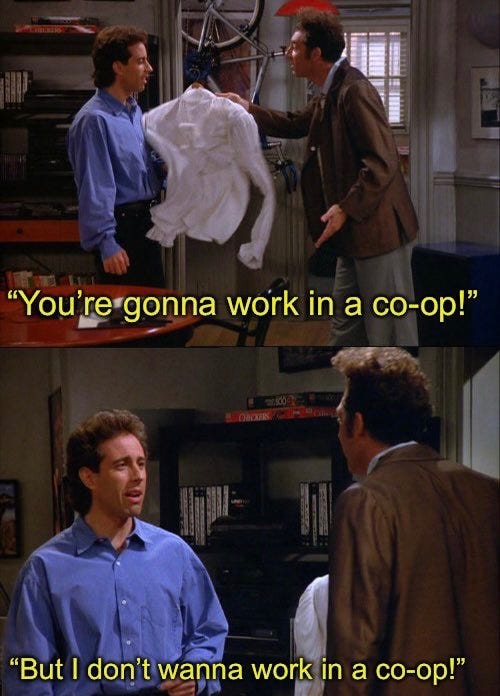The view that liberalism is compatible with socialism (or that liberalism requires socialism) is fairly common, but I’m skeptical. You can be a socialist or a liberal, but not both.
First things first: what’s socialism and what’s liberalism? I understand socialism to be an economic system with some version of democratically-organized collective ownership of productive property. One popular view holds that all workplaces should be democratically-organized cooperatives.
Liberalism is, roughly, the view that political institutions should prioritize respect for citizens’ liberties above other values. These liberties include freedom of speech, freedom of association, the right to own personal property, freedom of occupational choice, and more. By way of example, people will come to prefer different religious congregations and liberal institutions allow them to, in Mill’s words, pursue “their own good in their own way.” If the state mandated a particular religion, it would be illiberal. Citizens with different religious beliefs and practices would be prevented from realizing their own conception of a good life.
So why is socialism incompatible with liberalism? The short answer is that socialist regimes will fail to respect freedom of occupational choice. As noted above, people will arrive at different views of the good life and this will include different views of the best workplace. Some might want the role and risk of a worker-owner in a cooperative and others might want the role and risk of a wage-earning employee working for a capitalist employer.
Think of labor preferences like leisure preferences. You might prefer the beach, while your neighbor prefers skiing. Liberal institutions will of course respect people’s freedom to take either sort of vacation. Similarly, liberal institutions will respect people’s freedom to work in a cooperative or for a capitalist employer.
The challenge for the liberal socialist is to explain why the preference to work for a steady wage for a capitalist employer is undeserving of protection. And this is a difficult task, given that liberals don’t want the state to take a stand on what counts as the good life—they want to defer to citizens’ own judgments instead.





I guess the socialist's rejoinder here is twofold
1. Certain 'preferences' are so silly that we can assume, unless presented with strong contrary evidence, that they aren't really preferences (or are preferences one would prefer not to have). Take, for example, a gambling addict. Do they have a very strong preference for gambling? Sort of? They would probably be better off and happier if they gambled less, though. A socialist would say that someone's "preference" for wage employment is a pathological preference - it's not like preferring skiing over snowboarding, it's like preferring skiing over skiing whilst being given free money.
2. Some preferences are rivalrous at a societal level. You can prefer to drive on the left side of the road while I prefer the right, and liberalism can't just say "different strokes" even if both of us are totally reasonable. We need to choose. Perhaps a society that allows wage employment will never offer meaningful access to co-op employment, as co-ops get chewed up by comparitively ruthless capitalist enterprises.
The first argument seems paternalistic to me. Preferring to not correlate your risks is not the same thing as preferring to wash your hands until they bleed because you're anxious about global warming.
The second argument, I can see the case that the two modes of production can't coexist to the degree that some people would like. I genuinely think it's true that an (absolutely, if not relatively) large of people would actually like to work in a co-op, but not in a scenario where a for-profit wage enterprise can come eat the co-op's lunch.
Thing is, if wage employment and self employment can't really coexist and we need to choose one, wage employment is better and it's not even close. There are plenty of reasons for this, but really one stands above the others: it's better for economic growth, and economic growth is a necessary and nearly sufficient condition for prosperity.
the idea that individual groups of workers will own their workplaces under socialism doesn't seem viable to me for several reasons.
1. How will workers finance growing companies? will they take out huge loans? and from whom? how many workers would actually want to do this? my experience is most people want a steady paycheck, not to be the next jeff bezos or whatever. if the state controls all banking there will be no political freedom as the financial system will be entirely controlled by a single entity with the power to punish dissent. Wrong political views? = no loan.
2. people who are successful under our current system would just found companies that split low and high margin jobs. I.e. amazon would basically be the current amazon brain: marketplace tech and AWS tech. Everything else would be outsourced to low paid firms. This would kind of negate the whole argument (economic equality, hierarchy, etc) for this system in the first place.
3. even given 2, very few people would want to start a new company under this system. Why would you take the risk of getting a business off the ground when new people joining have similar/the same rights of ownership as you?